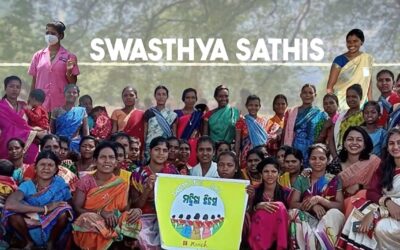How does a 5 year old non-profit organization conduct Covid vaccinations for more than 45,000 (and counting) migrant workers in one district? It is just one of the many initiatives at my host organization – Centre for Migration and Inclusive Development (CMID) in Kerala. These vaccination drives under National Health Mission are one-of -a-kind focused health interventions for migrant workers in Ernakulam district.
I jumped into their moving train in October this year, post the (actual) vaccination rush. In Kerala, the government, through the Department of Labour and Skills, had been conducting free vaccination camps specifically for migrant workers. As a part of it, CMID assisted in daily camps for more than 1000 people at a time. However, the department stopped active organisation of immunization camps after a while.
If we don’t, who will?
One of the biggest reasons for doing these specific camps is that every day and hour of work is crucial for workers to earn their livelihoods. It’s not easy to take a leave and commute to the government hospital which may not even have the vaccine available when they reach there. Hence, the CMID model involves going to their workplace and/or residential areas and conducting drives even if there are only 2 people in a company/factory.
The process involves team members conduct outreach activities to find out these factories in an area. It requires getting details about the number of people to be vaccinated and if second doses are to be administered, then which vaccine out of the two (Covishield and Covaxin), is required. Then we coordinate with the National Health Mission who ask us to collect the vaccine from a specific PHC (Primary Healthcare Centre) or a public hospital. They also provide us with details to start the session for a day as a ‘Vaccinator‘ on the Cowin portal.
Two cars each with a doctor, one or two nurses and coordinators then take a car trunk full of paraphernalia including everything from table cloth to emergency kits, three coloured bags for biomedical waste and even a printer to give copies of certificate wherever required. What this concerned effort needs is accurate database for each day. Hence, everyday we take a note of the number of people vaccinated for each dose in age brackets and send their complete details to the appropriate authorities.
While I summed it up in a couple of paragraphs, it is challenging to do it every single day.
Practical Challenges
- One of the biggest hindrances is not having the actual number of workers. The lack of data allegedly due to deflated numbers provided by the companies to labour department, grossly affects the work.
- The process is thus, time intensive. Places which say they have 10 people actually have 50 or vice versa and hence, sometimes a full day goes in figuring out these basic details. As the balance vaccines have to be returned to the PHC on the same day, we also have strict time constraints. On days when we barely do 50 vaccinations, there creeps in a feeling of guilt, for under-utilising the resources we have.
- There is a general disinterest in getting vaccinated now, especially by the employers, so that the working hours are not spent on anything else. In fact, many of them had an issue with providing a 30-minute rest period after the shot, when we went to conduct drives in their company itself.
- Many workers have registered in groups either by themselves or on behalf of their company, using one single phone number. This prevents them from getting their vaccination certificates as the online portal does not allow us to change the mobile number, once given. Additionally, if the vaccinators like us mess up a digit, the worker will not get the message or an access his/her certificate. This is where giving copies on the spot becomes beneficial.
In places where we cannot print the certificates, for anyone with a different registered number or just generally unaware about how to get the certificate from the website, we send it to their phone immediately through WhatsApp or Bluetooth. - There does exist unawareness and ignorance about the disease and need for vaccination. A lot of them are getting vaccinated so that they can travel at ease and/or not get harassed by police. It thus also becomes our responsibility to not only conduct these drives but to simultaneously also ensure health awareness. Many of our camps are thus followed with a visit to our Bandhu Clinic, a unique medical unit and India’s first mobile Covid screening unit for migrant workers.
- Our overall data have only a few numbers of women migrants. While accessing details, we have also observed that the female family members registered with the workers were not fully vaccinated. There have thus been added efforts to be more inclusive. We ensure travelling to industries such as fish processing which have many women workers. We also try to ensure privacy while vaccinating, wherever possible.
The challenging nature of the drives ensures that we always try to think a step ahead. We make mistakes and learn each time but the fact that we continue to reach out to 200-300 people everyday in one single district proves that there is still a lot of work to be done. If you wish to know more about our programmes or contribute to help us reach maximum number of workers, please get in touch here.






0 Comments